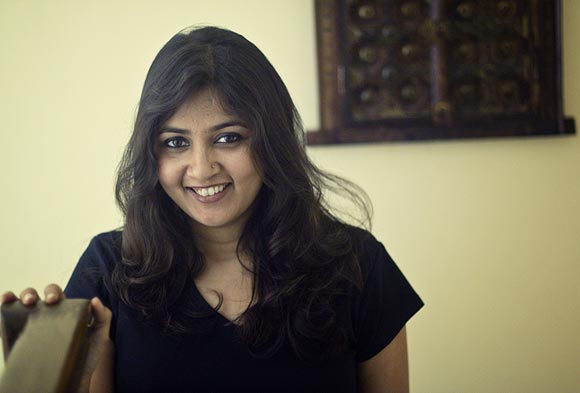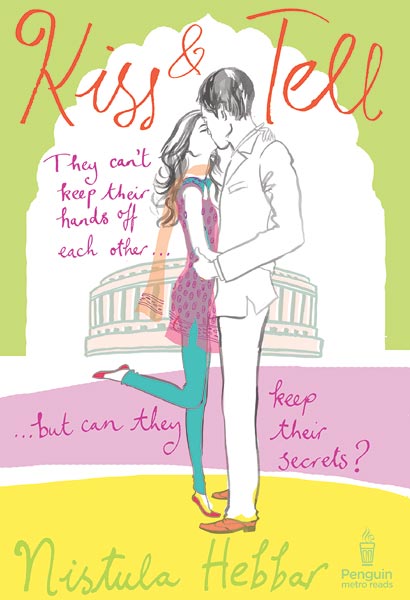With 12 years of experience in the field, Nistula Hebbar thought it would be interesting to bring the world of political journalism to Indian readers by way of a novel. In this interview with rediff.com's Nishi Tiwari, the young first-time author discusses her book Kiss & Tell, her career as a journalist and how the profession is actually far from what it is perceived to be.
The Indian readers' new-found interest in home-grown authors has resulted in several women journalists foraying into fiction writing, inspired by the urge to tell stories about their profession.
Political correspondent Nistula Hebbar is the latest entrant into this segment. The 37-year-old, who has been working on the beat for the past 12 years, had her debut novel Kiss & Tell recently published by Penguin India -- a tale of a political journalist (no surprises there), who falls in love with a bureaucrat.
When I walk into the coffee shop where we've arranged to meet, I find Hebbar engrossed in an animated conversation with her agent. She's talking about the equation between former prime minister Atal Bihari Vajpayee and LK Advani, the future of Uttar Pradesh politics and other pressing issues when I join in.
As we settle down for the interview, I ask her about her rather unusual name. She beams as if she saw it coming. "My father chose my name. He was very devout. He used to chant this verse and my name comes from there. It means beyond compare. He gave my mom a list of long-winded names. Nistula was the shortest of them all," she tells me.
A sociology major from the Delhi School of Economics, Hebbar is a Mangalorean, born and brought up in New Delhi.
She seems really kicked abut her new book and the protagonist, Janki. She says, "I tried to make the character as real as possible so that everybody identifies with her. She's not some filmi journalist."
"We are all working for a salary and we have a structure to our day. We have bosses who we report to and have targets that we have to reach and deadlines to meet. You try to show your activist side and you are shown the door -- you want to be an activist, join an NGO. All of that comes through in the book."
Below we bring you excerpts from an interview.
You are a political reporter and you've written a chick lit novel. How do you inhabit these two completely different worlds?
If you read the book, you'll realise that it has the voice of the girl as well as the guy. So I wouldn't say it's a chick lit story. It is a love story, wherein a professional world is also being explored. The characters also happen to be journalists and bureaucrats, so I don't really think there's a contradiction.
And since man and women occupy the same space, we can't really compartmentalise them. I think despite the categorisation of this book as chick lit, it can be read by guys as well. A lot of men have read it, but the only thing is that they have to cover it up because they can't be seen reading it. Its embarrassing for them. But a lot of men have read it and have told me that they actually enjoyed reading it.
Does it bother you if your book is classified under the chick lit category?
No, because I love reading chick lit, I don't think there's anything wrong with it. In fact, I think women are far more discerning readers and they read a whole lot more than men, so if this book is going out to women who are this huge group of buyers I don't have a problem with that.
As far as labelling is concerned, if you're labelling me it's your problem, not mine. I know what I have written, I know who I am. If you need to put a label on me to define me, it's your problem.
What kind of books do you like to read?
I read all sorts of books. I like both fiction and non-fiction. I also like murder mysteries. I read a lot of PD James. I absolutely don't read self-help books. I read indiscriminately and I read a lot. Self-help books are the only exception.
What kinds of films do you like watching?
Again, I watch everything -- from the recent Houseful series (which I loved) to the very serious Scandinavian cinema about nuclear winters etc. It really depends on my mood. I love Hindi films a lot. I recently watched Paan Singh Tomar and absolutely loved it.
Where do you draw your inspiration from when it comes to writing?
This one was straight from my work. I've been a journalist for the past 12 years. When you set out to work, nobody gives you a journal or a set of rules that you can follow. You have to meet the people on your beat and you have to hustle them for information. It really depends on your personality. Some people are very businesslike in their approach, others are friendlier and develop a rapport with those they work with. So I was struggling with all this in my early days as a journalist. You don't know what you're doing right, you don't know what you're doing wrong.
Sometimes things just fall into place and sometimes everything goes horribly wrong and you're pulled up for something you did because you didn't know better. So all these things got me thinking -- what people think of our profession is a million miles away from the reality of it. I thought maybe I need to put it down on paper and that's when I started writing.
But I couldn't do it the non-fiction way, so I started it like a love story because emotions can actually make you do things that aren't exactly ethical or morally correct and that can provide the central tension to the plot of the book. I got to explore a lot of these issues in the book.
'Nobody wants to read books where foreigners are writing for foreigners'
You've mentioned in the book that you suffered from writer's block in the course of writing the book.
Actually not so much. It was the Delhi winter that completely felled me. Despite being born in Delhi I hate winters. I just go into hibernation when winter arrives. So I used to get myself to work and in the pleasanter months, I'd get up early and write till 8 am before I left for work and I'd come back from work in the evening and write for an hour or so.
What happened in the winter was that I couldn't get myself out of the bed in the mornings. So I didn't write at all in December-January. My editor was really patient with me and I finally managed to finish the book by March. So that was the writer's block. Also, I struggled with the dialogues a bit. You may react to a certain situation in a different way, but you have to visualise how a certain character would respond. So that was something that I had to work on.
I'm not an aggressive or a confrontational person, unlike the protagonist. She just says it like it is. So I had to isolate myself from the protagonist. I may avoid getting into an unpleasant situation, but the character can't do that, so that was a bit of a stretch.
It wasn't a very difficult book to write. Anybody who's read it will tell you that it reads very easily.
There are writers who take a break from their jobs and dedicate time to their books. Did you do that?
I can't afford to do that. I got paid very little to write this book. Besides, my day job is really important to me. I like being a journalist; it's a career I chose despite the fact that we have very little compensation in terms of the hours we work and even the money that we make.
Is it true that you have to be in a certain frame of mind when you're writing a book? Since you were working a full time job while you wrote the book, how did you manage?
I don't think you necessarily have to do that. I've been very good at compartmentalising. So I would get up at six in the morning and write till eight. Then I'd read the paper, fix appointments for the day, go to work. When I was writing, I didn't think about work and when I was back home, I didn't think about work. I decided upon the number of words I'd write each day and I stuck to it, even if I had to delete them the next day.
I think you have to do that if you want to keep your day job and keep writing.
How much of you is Janki, the protagonist?
None, actually. She's completely different from me.
But there are bits that resemble your life. Like Janki's mother is a professor and you mentioned that your father was a professor too.
That's when I got lazy. I didn't want to research into someone else's life and give that background to the protagonist. So I decided I'd give her a background that I know about.
It's just my writing that has gone in the book. Janki is nothing like me, in the sense that she lets things that can possibly ruin her life slide. I'd never do that, I'd take a call much earlier. I firmly believe that the means never justify the end.
How do you think Indian authors are being received by readers in India?
I think Indian authors are doing really well. One of the reasons that I could get a publisher for my book was that the market has opened up. Nobody wants to read books where foreigners are writing for foreigners, or Indians are writing for foreigners. People want to read Indian writers writing for Indian readers, about our lives, our cities.
Now that the book is out, what are you planning to do next?
I'm in talks with Harper Collins for a political biography, but I can't really talk about it right now. I really enjoyed writing fiction. I was under the impression that I should be writing serious stuff ,since I've done my Masters in Sociology from such a reputed institution. But I've realised that this entire experience has been good for me so I think I'm going to stick to it. One of my short stories appeared in Femina in a serialised form, iIquite enjoyed doing that too.
Is it true that every journalist eventually wants to become a writer? When did you realise you wanted to try writing?
Yes, because they are tired of writing within the 350-word limit (chuckles). As for me, I'd always wanted to become a writer, but I hadn't had any compelling urge to sit down and write. I didn't really have a story. At the beginning of my career, I was working very hard at trying to make sense of how it all works. My goal was to gain respect as a print journalist.
This book was very accidental. I was at work trying to get through to someone over the phone and that person was taking forever to come onto the line. So I just took my pen and started writing. The first four chapters were written very quickly. But then I was like, okay, I'm not writing anymore unless I get a publisher.
So I sent it to a couple of publishers and Penguin said yes almost immediately, so I resumed writing.
But I never thought I'd write chick lit for my first book -- politics or something equally serious seemed to be the more obvious choice.



Comment
article